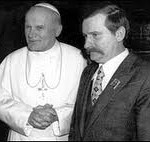
New Ottawa Catholic school board speaker guidelines omit 'dignity of work'.
by Dennis Gruending
In Ottawa recently a group of Catholic parents protested to their school board over Justin Trudeau’s appearance in November 2012 to talk to students at a Catholic school about bullying. Some parents told the board this was a “scandal” because Trudeau supports same-sex marriage and a woman’s right to choose. According to slides from their presentation, a group of parents called upon the school board to prevent appearances by anyone advocating “ideas that are contrary to the social and moral teachings of the Catholic Church.”
The pressure appears to have worked, at least in part, because the Ottawa board has amended its policy. Previously, it read that partnerships and sponsorships must be “consistent with the Board’s philosophy, Vision statement and Catholic Social Teaching.” The statement went on to provide some detail about the social teaching mentioned, including “the dignity of the human person, human rights and responsibilities, common good, solidarity, the preferential option for the poor, and the value and dignity of human work.”
An 1891 papal encyclical about labour and industrialization stated a need for an improvement in what Pope Leo XIII called “the misery and wretchedness pressing so unjustly on the majority of the working class.”
The Church’s historic teaching about human work begins with Pope Leo XIII in 1891, when he released his encyclical Rerum Novarum (On the Conditions of Labor). There was a new and rapid industrialization at the time that attracted people to cities and factories where they often existed in desperate conditions. The pope’s primary stated concern was the need for an improvement in what he called “the misery and wretchedness pressing so unjustly on the majority of the working class.”
Pope Leo called for a living wage without describing it in those exact words, although later popes did so. He defended private property but also the right, even the necessity, of workers to protect themselves by forming trade unions. His teaching has been supported and repeated by other papal encyclicals for more than 100 years.
In 1981, Pope John Paul II reasserted the importance of workers forming unions.
“Their task,” he wrote, “is to defend the existential interests of workers in all sectors in which their rights are concerned. The experience of history teaches the organizations of this type are an indispensable element of social life, especially in modern societies.”
This encyclical remains relevant today for its insistence that human dignity and social justice must take priority over capital. In other words the needs of people are more important than the wants of capital. The encyclical is an antidote to those who argue that even if unions were needed in an earlier era, they are no longer relevant today. Those arguments deliberately ignore the reality of conditions in the garment industry in Bangladesh or on the kill floor in Alberta slaughterhouses, to cite but two examples.
Pope John Paul also affirmed the right to strike as being “legitimate in the proper conditions and within just limits.” He added, however, that the “the strike weapon” is an extreme means that should rarely be used. The Canadian Labour Congress (my employer) says that more than 99 percent of union-management contracts in Canada are successfully concluded without a strike or lockout occurring.
If potential speakers in Catholic schools are to be vetted for what they think and say about same sex marriage, for example, then the vetting should also extend to what they say, or have said, about the rights of workers to organize unions and to engage in collective bargaining.
If potential speakers in Catholic schools are to be vetted for what they think and say about same sex marriage, for example, then the vetting should also extend to what they say, or have said, about the rights of workers to organize unions and to engage in collective bargaining.
In practice, that would mean that a good number of media and political luminaries — Pierre Poilievre, Jason Kenney and the CBC’s Kevin O’Leary, to name but a few — would never grace a podium in a Catholic school because they oppose, at least substantially, the church’s social teaching on work and labour unions.
But there is a solution that is much preferable to a Catholic McCarthyism that attempts to censor and attack people such as Justin Trudeau and President Obama in the US, where some Catholics protested against his being invited to speak at Notre Dame University.
The better idea would be for Catholic schools, not to mention parishes and dioceses, to ensure that the Church’s social teaching is taught, preached and discussed. That teaching is a well-kept secret because few educators, clergy, or even bishops appear interested in promoting it.
© Copyright 2013 Dennis Gruending, All rights Reserved. Written For: StraightGoods.ca
 Dennis Gruending is an Ottawa-based author and former Member of Parliament. He is also a former director of information for the Canadian Conference of Catholic Bishops. His books include the biography, Emmett Hall: Establishment Radical and his latest book is Pulpit and Politics: Competing Religious Ideologies in Canadian Public Life, recently released by Kingsley Publishing Services of Calgary.
His blog can be found linked below.
Dennis Gruending is an Ottawa-based author and former Member of Parliament. He is also a former director of information for the Canadian Conference of Catholic Bishops. His books include the biography, Emmett Hall: Establishment Radical and his latest book is Pulpit and Politics: Competing Religious Ideologies in Canadian Public Life, recently released by Kingsley Publishing Services of Calgary.
His blog can be found linked below.
Sorry, the comment form is closed at this time.